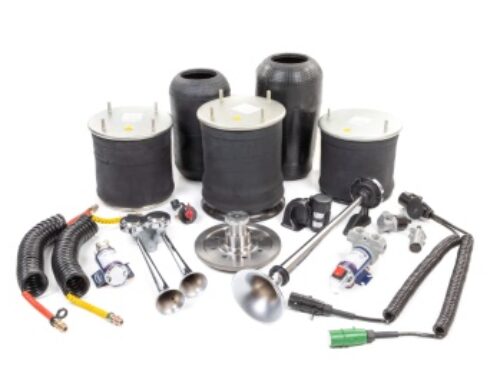Taking steps to safeguard your O-licence
 Mark Lewin, director at transport training provider Novadata, explains why training can be key to maintaining any operator licence
Mark Lewin, director at transport training provider Novadata, explains why training can be key to maintaining any operator licence
As most transport professionals now know, from May 2022 it has been necessary for those operating vehicles in excess of 2.5 tonnes to travel overseas for hire or reward to hold a standard operator licence. The new rules apply to vans in excess of 2.5 tonnes, van and trailer combinations or car and trailer combinations in excess of 2.5 tonnes.
For some organisations, the changes to include vehicle combinations of more than 2.5 tonnes will simply mean that the rules apply to more vehicles in their fleet, but for many, the requirement to hold an O-licence will be completely new. This in turn means that a whole new swathe of people will need to employ a transport manager or gain a Transport Manager CPC qualification.
Whether you are new to needing an O-licence, or have held one for years, the key to safeguarding your O-licence once you have acquired it, is through regular training. While it is true that in order to hold a Transport Manager CPC qualification, you need only take and pass the examinations once, you certainly should not rest on your laurels once you have achieved it.
As a transport manager or O-licence holder, you should adopt the mindset from the beginning that training and development will now be a regular part of your professional life. There are many good reasons why you should regard it as such.
Firstly, it is unlikely that you will use all your newly acquired knowledge the moment you pass your exams and gain your qualification.
Management CPC, as it is often known, is fairly broad. As every organisation is different, so there will be some circumstances that the Management CPC course outlines that you may not encounter for several years, if at all. You may need to refresh your knowledge before you apply some aspects of your initial training.
Secondly, transportation legislation, like the industry itself, is far from static. It evolves. The rules may have changed since you qualified. The longer ago that was, the more likely it is.
 Thirdly, you have some serious legal obligations, especially as an O-licence holder. As the person – often a company director – who signs the O-licence application form, you cannot wholly delegate all your legal responsibilities to a transport manager.
Thirdly, you have some serious legal obligations, especially as an O-licence holder. As the person – often a company director – who signs the O-licence application form, you cannot wholly delegate all your legal responsibilities to a transport manager.
You can, of course, delegate all the day-to-day management of the fleet, but you will still be jointly responsible with your transport manager for fulfilling the undertakings to which you agreed when you applied for your O-licence. This means that you need to stay up to date with O-licence fulfilment best practice, as well as your transport manager.
This is not particularly onerous, but it does mean that both transport managers and standard O-licence holders (and indeed, restricted O-licence holders as well) should plan some refresher training every few years.
This only means taking a couple of days out of everyday activity, but it is time well spent, as it could make the difference between knowing how to maintain a healthy operator compliance risk score (OCRS) and putting your O-licence at risk; coming to the attention of the traffic commissioner for all the wrong reasons.
If you do come to the attention of the traffic commissioner – usually a stressful experience you could do without – they will almost certainly insist that you attend some form of professional training. This will be either Transport Manager CPC Refresher training, or Operator Licence Awareness Training, also known as OLAT, depending on your circumstances.
Undoubtedly, traffic commissioners are far more impressed by, and sympathetic towards, those who voluntarily undertake training and do their best to stay current with best practice, than those who neglect refresher training until forced into it. If you know that the traffic commissioner is looking closely at you, we strongly recommend signing up for a course before you appear before them.
When choosing a trainer, it is wise to select one who has genuine experience of the transport industry as a professional. A trainer with ‘hands on’ experience will be better able to help you to understand how theory should be applied in practice, and will be able to help you to understand how to overcome any challenges that compliance might seem to pose.
 Lastly, you should make sure that any of your drivers who require periodic Driver CPC training also attend regularly. It is usually easier to let them take one day each year to complete a single training module than to find an entire five-day week for them to fit in all their training in one go.
Lastly, you should make sure that any of your drivers who require periodic Driver CPC training also attend regularly. It is usually easier to let them take one day each year to complete a single training module than to find an entire five-day week for them to fit in all their training in one go.
Traffic commissioners also like to see regular driver training as a part of professional development. Revising accurate use of the digital tachograph every few years is very wise, especially if there are revisions to drivers’ hours, as was the case quite recently.
The wise transport operator will never stop considering how best to protect their all-important O-licence. Putting it on the agenda as a regular item for report is wise as it stops is getting forgotten. After all, for so many organisations, it may well be a case of no O-licence, no business.
Lastly, it is worth remembering that training can be quite stimulating and enjoyable. We’ve lost count of the number of times that candidates find that something covered in the course will actually make their life easier and benefit their business. Don’t neglect it.











